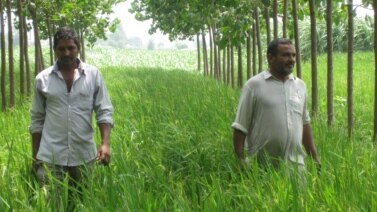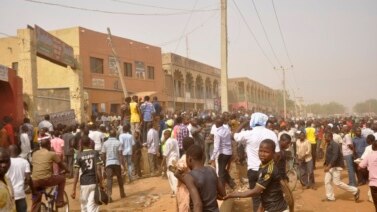An international human rights group has accused Israel’s government of forcing thousands of African asylum seekers to return home. The group, Human Rights Watch, says once home they could face time in prison and possible torture.
Some 2,000 African asylum seekers live at the Holot detention center, in the southern Israeli desert. They can leave during the day, but must report back three times a day. Across the street from the detention center is the Saharonim prison, where more than 1,000 Africans are held. They cannot leave.
More than 50,000 Africans, mostly from Sudan and Eritrea, have arrived in Israel in the past eight years. In a report released on Tuesday, Human Rights Watch says these migrants are not permitted to work, and very few have been given asylum.
Bill Van Esveld is with Human Rights Watch. He says the Israeli government wants the detainees to leave.
“There’s been a series of laws put in place that basically gives people the choice between being able to stay in Israel but potentially in indefinite detention, or being sent back to the country they came from. We actually think this constitutes effective “refoulement,” which is a refugee law term that means you’re basically being forced back to a country where you face a well-founded fear of some kind of persecution.”
Some Israelis say that the large number of asylum seekers is a threat to the Jewish state. The government built a fence along the Egyptian border to keep them out. Israeli Prime Minister Benjamin Netanyahu says his government is prepared to remove those who succeeded in entering before the border was closed. But in his words, “I want to make clear that these are not refugees. We are talking about illegal workers..."
Sudanese who return home risk 10-year prison terms for traveling to Israel. Eritreans face punishment for avoiding required military service. Even with these risks, almost 7,000 have returned home.
Bill Van Esveld says the policy needs to change. He wants Israel to, “give these people a year-long, renewable protected status that allows them to work and that allows them to be here legally.”
Some Israelis do not want the African asylum seekers in their communities. But others support them, recalling their own past as refugees.
I’m Bob Doughty.
*This report was based on a story from VOA correspondent Scott Bobb in Jerusalem. Ashley Thompson wrote it for Learning English. George Grow edited it.
Words in this Story
accuse – v. to say a person or group is responsible for an act or crime; to make a statement against someone
asylum seeker – n. a person who, for reasons of race, religion, social group, or political opinion, has crossed into a country in which he or she hopes to be granted refugee status
refugee – n. a person who has been forced to flee because of unjust treatment, danger or war
detention – n. the act of keeping someone in a prison or similar place
Now it’s your turn to use these Words in this Story. In the comments section, write a sentence using one of these words and we will provide feedback on your use of vocabulary and grammar.





